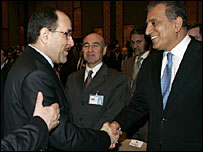 The security conference in Baghdad involving Iraq’s neighbours and Security Council members on 11th March was yet another attempt by the United States to try and regain control of Iraq. The conference was an endeavour by the US to involve regional powers in the attempt to stabilise the spiralling violence and chaos that have come to define Iraq under US occupation.
The security conference in Baghdad involving Iraq’s neighbours and Security Council members on 11th March was yet another attempt by the United States to try and regain control of Iraq. The conference was an endeavour by the US to involve regional powers in the attempt to stabilise the spiralling violence and chaos that have come to define Iraq under US occupation.
The US has once again avoided focusing on the real reasons behind this conflict as it has always done. Citing failures by Iraq’s neighbours to control the alleged flow of fighters and arms through their borders, the US is trying to both shift the premise and its own failures on to others. The resolutions of this conference were agreements in principle to form working groups on border security, fuel imports and refugees, and to hold another regional meeting at the foreign minister level, as early as April. Iraq and Iran lobbied for it to be held in Baghdad, whilst the United States expressed its desire for Istanbul. The working groups would involve only technical experts from Iraq's six neighbours.
These resolutions ignore the fact that the main cause of Iraq’s instability is the presence of foreign occupying forces under the command of the US. The Muslims of Iraq have a puppet regime imposed upon them that serves US interests whilst weakening the state of Iraq. The US is only interested in strengthening its position in the Middle East and not in helping the Iraqi people. All of its actions to date are a testament to this fact. The United States has used brute force before in an attempt to quell the Iraqi resistance movement. The massacres of Fallujah and Mahmoudiya, the humiliation and torture of prisoners at Abu Ghraib and attempts by the US to gain control of Iraqi oil are all examples of it’s failure in its attempt to control Iraq. These attempts have lead to sectarian conflict, which can only help to serve the US strategy of divide and rule, together with the death of more than 650, 000 Iraqis since the invasion. Yet embarrassingly the mounting losses suffered by the US and its allies in terms of personnel, equipment and money are leading to growing domestic pressure on the US administration.
The US has finally run out of options and in a last gasp attempt to regain control in Iraq is having to talk to players it has hitherto been hostile to. Shamelessly Iraq’s neighbours have accepted the US premise for these talks and in doing so conveniently ignore their own role in supporting the US when they provided their airways and waterways for US forces to attack Iraq in 2003. They too have obediently come to the table in another example of Muslim rulers serving foreign interests at the expense of the Muslim Ummah.
The only outcome possible from such conferences would be an attempt to strengthen the grip of America over Iraq at the expense of the Muslims of Iraq. Indeed the US commander in Iraq, General Petraeus, has candidly admitted that talks will have to be held with some of the more ‘moderate’ groups that are currently engaged in fighting the US occupying forces in Iraq if a way forward for America in Iraq is to be found. The US is trying all it can to hold on to Iraq, its resources and prevent a Caliphate from being established in the region. It is forcibly trying to subjugate the Muslims in Iraq to accept its rule, embed its presence and support its puppet Iraqi regime. This new regime can only serve America, and not the Iraqi people, as it derives it’s power from US security. This can already be seen from the new constitution of Iraq. It establishes governance on federal lines and helps the US to weaken the Iraqi state, undermine its sovereignty and thereby make it easy for America to control the land of Iraq. It is this new constitution that helped stir up sectarian conflict in Iraq, as the various parties vie for their own interests instead of working for all the people.
The root cause of the conflict in Iraq is the occupation and presence of US and coalition troops. Until America leaves Iraq, the resistance will increase, and America will use more violence to control the Muslims in Iraq who hate its presence. The US occupation is the main problem for Iraq. All other issues are secondary. Until the occupation ends the Muslims of Iraq and the region cannot determine their own political destiny, which lies with Muslims and Islam alone.
